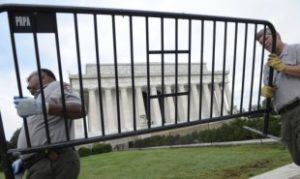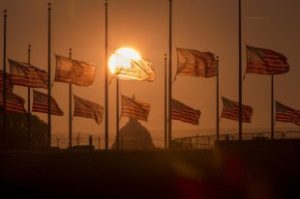We here at Yahoo like making lists out of chaos. As 2013 closes out, we’re back with Top 10 rankings ofsearches, news, obsessions and more. But sometimes, what doesn’t make a Top 10 list can be as intriguing as the frontrunners.
Part of this might be that 2013 wasn’t meant to be as riotous, stomach-churning, heartbreaking and exhilarating as it turned out to be. This year, by many indicators, was supposed to be America’s return to normal: A recovering economy meant we were getting back in business and wrapping up election politicking. The financial sector offered cheery news: record corporate earnings, housing market surges,hot IPOs, low credit debts. (And if you were into punishment, a few SEC convictions of Wall Street highfliers satisfied a bit of bloodlust.)
You didn’t have to dig too deep, though, to find corporate largesse didn’t quite translate to robust hiring, and that inflated home prices could be traced to scarce housing supply. Another big anchor dragging the economy — and country — down: paralysis on the Hill.
[Related: Scroll through our Top 10 News stories slideshow]
Capitol punishment

For 16 days, more than 800,000 federal employees stayed home. An additional 1.3 million went to work with no idea when and if their next paycheck would come. Tea party Republicans sought to tie the debt limit vote to Obamacare funding, a strategy reportedly tracked to a plan hatched by former Reagan administration officials.
This made for some head-spinning grandstanding, such as when (paid) government officials berated (not yet paid) government employees for shuttering national parks. One Rep. Randy Neugebauer, R-Texas, even scolded a park ranger, although he did apologize two weeks later. The little faith in Congress collapsed like a pinpricked hot air balloon in a vacuum environment. The standoff might have cost the economy $24 billion. Had it stretched a mite longer, the phrase “government shutdown” would’ve cracked the Top 10 … so just as well it didn’t.
[Read more from political columnist Chris Moody: Shutdowns and shoutdowns: In 2013, Congress takes a gap year]
Spooks in the machine
Even without the shutdown, the government, to put it mildly, wouldn’t have had a great year. Political scandals — real or manufactured — are inevitable and at first the 2013 uproars — like the IRS watch list of Tea Party nonprofit applications — didn’t even have the sex appeal of last year’s Secret Service Colombian prostitute revelations or the General Services Administration’s spendthrift rock-party conferences. Then a National Security Administration security contractor named Edward Snowden leakeddetails about the agency’s electronic surveillance program, PRISM.
Government spying on its own citizens and allies isn’t exactly a revelation, and has existed long before the Patriot Act or Wikileaks. In fact, subjects like McCarthyism, FBI Director J. Edgar Hoover and the blacklist have inspired a recent fictional renaissance in movies, TV and books.
Still, the extent of the surveillance was breathtakingly disturbing. For some citizens, however, vigilance — the price of liberty — isn’t as contentious as who’s doing the vigilance: Citizens were split on Snowden himself, who averaged more searches on Yahoo in 2013 than the NSA agency itself. Was he a patriot or a traitor? Was he in Hong Kong or Russia? At one point, people followed his trail online from Hawaii to Moscow’s Sheremetyevo International Airport like a game of “Where’s Waldo?”.
More worrisome was the access that a Booz Allen Hamilton freelancer had, in a top-secret position with an end date. There are a half million workers like Snowden, and scrutiny on what they can see — as well as their loyalties — has barely begun.
[Read more from tech columnist Rob Walker: Whistlehacking in the surveillance age]
The rainbow effect
As politicians shift from the culture wars to target big government, social revolution has been waged in courtrooms, state legislatures and religious organizations. In 2013, gay rights hit milestone after milestone, from the Supreme Court voiding section 3 of the Defense of Marriage Act to the new pope suggesting a departure from the Catholic “obsession” with homosexuality. An outspoken segment still resists what they consider unnatural alliances, but the upcoming generation holds little objection to the freedom to marry.
[Read more by news reporter Liz Goodwin and Yahoo Studios: Landmark year for gay rights]
The gun battle
The December 2012 massacre of 20 children in Newtown, Conn., galvanized the White House to lead an effort to strengthen laws on background checks and gun-show purchases. Ever since Obama’s election, however, the NRA has warned that the president would neuter the Second Amendment. In 2013, searches on Yahoo rose across the board for online gun listings, reflecting a possible record level of firearm sales as gun shops ran low on inventory.
The effort failed. When Aaron Alexis, another mentally disturbed gunman, massacred 12 people at the Washington Navy Yard, outrage was mooted. That didn’t diminish the tragedy any less. The question over how society handles the mentally ill remains unresolved, especially as many states still fail to comply with existing laws to flag mental health records to the national database.
Clay feet in sports
Downfalls in the sports world also set searches afire, from the doping confessions of Lance Armstrong and Alex Rodriguez to the appalling death of Oscar Pistorius’ girlfriend, Reeva Steenkamp.
The one that sent shock waves online, however, was the arrest of Aaron Hernandez. The promising New England Patriots tight end had earned All-American honors in college, although his drug use and suspected gang ties had dragged him down to a fourth-round pick. Still, the Patriots took a chance. Three years later, the organization was offering free exchanges for No. 81 jerseys, after Hernandez was accused of killing his friend, semi-pro player Odin Lloyd. He might face more than one trial, as investigations tie him to other unsolved homicides.
Disasters, natural and industrial
Extreme weather and natural disasters dominate the news. This year was no exception with catastrophes domestic and international, including the Oklahoma tornado devastation, the calamitous floods in Colorado, and Typhoon Haiyan’s terrorizing swath that killed thousands in the Philippines.
Industrial accidents also figured prominently in 2013. The Bangladeshi factory collapse that killed 1,129 prompted consumers to examine the conditions in which their goods were made. City and residential blocks were leveled in West Texas, where a fertilizer plant exploded, and in the Quebec town of Lac-Mégantic after a fiery train derailment.
Arab Winter 
There is a curious truth to the government shutdown: Even a nonfunctioning American government is still a working democracy. People have closely followed Middle East tumult following Arab Spring: Syria civil war (No. 6) made the year’s Top l0 news list, but searchers also followed developments in Libya and Egypt.
There was one spot of cautious optimism: Iran agreed to curtail its nuclear program provided that the U.S. ease off on $6-7 billion in sanctions. Israel criticized the deal but, nevertheless, dialogue among seven countries after 30 years might indicate a slim possibility of real change. There will be much to look forward to in 2014.
[Read more by political columnist Olivier Knox: Obama’s plan for Arab Spring]
This article was updated after the death of Nelson Mandela surged into the top 10 News stories. The Aaron Hernandez arrest had been at No. 10.
